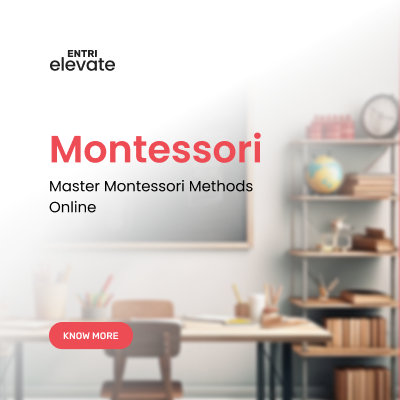Table of Contents
The Montessori Approach is a prominent academic doctrine that encourages a child-centric education domain. Montessori teaching is all about how to emphasize freedom and discipline by exploring the individuality of the child. It is in short, child-centered education which has its significant purpose and meaning.
Montessori Approach
The Montessori Method highlights freedom, investigation and admiration for uniqueness and originality. Paramount to this approach is an optimistic domain, which strives to promote self-discipline, passionate and emotional brilliance and inherent stimulation in juveniles.
Optimistic discipline strategies are utilized in Montessori academies and childrearing techniques at residence to guide children’s manners and sustain their individual development. The Montessori methods won’t make use of the corrective actions. They focus more on the child’s development by strictly centering on the child’s slow growth.
The Montessori principles acknowledge that kids have an intrinsic purpose to discover and investigate the children’s surroundings. Montessori education concentrates on the raw solicitors of acquaintance and has an intrinsic urge to become self-sustaining human beings.
The Montessori strategy determines the effectiveness of nourishing juveniles with liberation from the traditional method of teaching in a safer academic space to relieve their holistic evolution.
Start your journey to becoming a certified Montessori teacher! Get free Demo Here!
Finding the apt Montessori teacher training course is the key to becoming a successful teacher who can contribute to the overall growth and development of the child. Entri Elevate Montessori Teachers Training course is developed to prepare teachers in the Montessori mode of instruction.
It shields various elements of education such as study planning, classroom administration, curriculum set-up and syllabus expansion, and child psychology. Entri’s Montessori Teachers Training course can assist instructors in formulating the talents and understanding required to complete an optimistic and adequate learning space for the learners.
How is discipline handled in Montessori?
Discipline is handled in Montessori teaching as an integral part. Creating a supportive learning space for the child is the most important aspect of Montessori teaching. The Montessori teaching allows the child to mold the independent nature and nurture the skills that are part of the child’s development. The toddlers will gradually feel a sense of security. The Montessori teaching facilitates positive discipline to the children which can direct the development of individuality.
The Montessori teaching establishes a regular practice for toddlers. They will stick to the regular structure, predictability and design. They will be practised to follow the regular pattern. The discipline is slowly initiated. The toddlers can select their book or snack from the options given.
The Montessori teaching offers two choices to the kids. They can be independent. It can also promote skills and choice-making. They will be allowed to choose from the options given which enhances their decision-making skills.
Using the redirecting technique is the initial technique to discipline. Instead of strictly saying a firm no to the child, they will get another better option. The toddlers will be taught to express their emotions through verbal communication rather than throwing tantrums.
They will be trained to use the words positively rather than using bad words. The child will be given enough space to collect themselves. They have to reflect on their actions rather than giving them punishments.
Start your journey to becoming a certified Montessori teacher! Get free Demo Here!
How does Montessori handle behaviour issues?
In Montessori education, discipline is considered a possibility to coach and sustain the child’s action rather than a mechanism of discipline. The behavioural issues will be handled with utmost care without creating havoc. Positive discipline techniques align with Montessori regulations, emphasising compassion, consideration and familiarity with each child’s requirements.
Montessori educators and parents employ optimistic underpinning, transmission and problem-solving strategies to divert demeanour completely. This system acknowledges that kids may display demanding demeanours due to unmet demands or vigorous labour, and managing these underlying elements is indispensable for their development.
The Montessori approach keeps the position of the trainer not to implement uncompromising practices and discipline mischievousness, instead, they instruct and promote children’s education. The social-emotional growth of the children is facilitated. Self-regulation and practice will be promoted to make sure that the child is growing in a comfortable space.
Start your journey to becoming a certified Montessori teacher! Get free Demo Here!
What is the approach of Montessori education?
The Montessori approach focuses on creating discipline among the children by constructing a protective environment where individual needs are catered to. It is driven by compasses that encourage optimistic and compliant conditions for children’s evolution.
The Montessori rules operate as fundamental approaches for parents and teachers who are particularly interested in investing time and effort to specialize in enforcing positive discipline. In front of the child, make sure to use only the positive language/ clear language. Make the communication effective without creating any gaps. Communication can guide the child to proper behave.
Make sure you are respectfully speaking to children. Make sure that you sound encouraging by expressing your thoughts and emotions effectively. Rather than assessing artificial developments, Montessori endorses permitting children to participate in the unpretending effects of their movements. This process enables children to comprehend and allows them to take responsibility for their actions.
The Montessori approach allows more freedom for children. Montessori acknowledges encouraging autonomy and liberation. Equip children with possibilities to complete options and employ self-directed knowledge, encouraging them to assume ownership of their actions.
The Montessori teaching recognizes the value of the children’s emotions and encourages them to be more expressive. They should feel safe to express their thoughts and ideology. Effectively, this approach creates a space to have their ideologies.
The development will be made available with the help of creating a new routine for the children. This will create a sense of stability in the mind of the child. The Montessori approach facilitates academic and social growth alike.
Start your journey to becoming a certified Montessori teacher! Get free Demo Here!
What is freedom and discipline in Montessori?
In the Montessori approach, freedom stands for fostering the child’s capability to determine their movements and function. They can move at their own pace with flexibility. Children are inspired to desire movements founded on their appeals and developmental requirements.
The children will be given the freedom to choose from the options. The Montessori education relies on the concept of freedom within the limits. The children will be given the space to explore at their own pace. They can learn independently. The freedom will be given to the child to explore and grow at their own pace.
Start your journey to becoming a certified Montessori teacher! Get free Demo Here!
What is the balance between freedom and discipline in the Montessori method?
The balance between freedom and discipline in Montessori education offers numerous benefits for children. The freedom of choice will make you more confident and will expose the child more actively to the world. The freedom will facilitate decision-making.
The child will learn how to priorities things. They shall be responsible for their actions. The freedom permits children to cater for the intention of self-discipline and attention. Montessori education also promotes the expansion of fundamental life skillfulness.
They will be allowed to know the basis of their actions. The freedom to choose and accept individuality will be promoted. The children will learn to manage time and solve problems. The children will be self-motivated.
Why is freedom important in the Montessori classroom?
The Montessori approach mainly focuses on freedom. It is not to allow the children to do whatever is pleasing to them. They will be catered to choose from the given choices. The children will be given more freedom to choose the actions and assume the privilege of their knowledge.
This liberation entrusts kids, promotes their insight of commitment, and improves their trust in the self. At an early age, children will be given apt freedom to understand the world in better terms. The Montessori education allows the students to correct themselves and dwell more on problem-solving skills. The learning will be an interesting factor for the children if they are part of the Montessori education system.
Start your journey to becoming a certified Montessori teacher! Get free Demo Here!
What is the concept of discipline equals freedom?
In the context of the Montessori education, the discipline and freedom are equally important. The concept of discipline is always equal to the freedom given to the children. Discipline in Montessori education is not about strict discipline. But it is about self-control, self-discipline, and respect for others.
Montessori education delivers children with a structured pattern for discipline. The freedom to choose will automatically come with the discipline. The normalisation will happen. The freedom will allow the child to explore the individual essence at their own pace. This will generate discipline.
Discipline and freedom are interconnected. Children will be naturally specialised to develop a sense of focus and improve their attention span and concentration. The children extend their capability to focus for lengthened generations, showing self-discipline and an intention of the internal directive.
Start your journey to becoming a certified Montessori teacher! Get free Demo Here!
Montessori education mainly focuses on the value of freedom and discipline. the children in Montessori classrooms will be given more freedom to explore and make choices of their own. The children will understand the importance of making choices and learning will be made easy.
Montessori education is known for the structured learning space for the children to become more confident and responsible children.
Entri’s Montessori teaching course is a six-month course which will allow you to explore the doubt clearance session. Live and recorded sessions. CEED International, American Association Of Teachers & Trainers, and UK Certifications will be provided.
Entri’s Montessori teaching course will be aligned with the encyclopedic curriculum and is designed to complete transnational measures. Personal and professional growth guarantees the most suitable activity aligned with international academic measures. Join Entri to give wings to your dreams!











